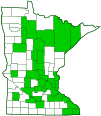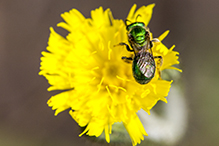Pure green sweat bee
(Augochlora pura)
Conservation • Description • Habitat • Ecology • Distribution • Taxonomy
Conservation Status |
|
||||
| IUCN Red List | LC - Least Concern |
||||
| NatureServe | NNR - Unranked |
||||
| Minnesota | not listed |
||||
Description |
Pure green sweat bee is a moderate-size, solitary, metallic green bee. It occurs in the United States east of the Great Plains, and in adjacent Canadian provinces. It is common in the eastern two-thirds of Minnesota where it reaches the western extent of its range. Males and females are the same size, 5 ⁄16″ long. The head, thorax, and abdomen are bright metallic green, sometimes with a coppery tint, sometimes just coppery, rarely blue. The body is covered with erect whitish hairs. The head is covered with relatively short hairs. The face above the upper lip (clypeus) is shiny and moderately covered with well-spaced, shallow pits. The upper margin of the clypeus does not extend the width of the face, but is intruded upon by lobes of the plate above it (epistome). The tongue is short. The last segment of the tongue (glossa) is short and pointed. The antennae are black. Below each antennal socket there is a single vertical groove (suture). The wings are clear and lightly tinted smoky brown. The lobe at the base of the hindwing (jugal lobe) is longer than the submedian cell. The marginal cell of the wing is squared off (truncate) at the end. There are three submarginal cells, the first one longer than the third. The basal vein is strongly arched. The structure at the base each the wing (tegula) is dark brown and oval. Each abdominal segment has a very narrow dark margin but the abdomen is not conspicuously striped. The legs are brown and brownish-black with short hairs. The female has a scopa, a dense patch of longer, branched hairs used to collect pollen, on the fourth segment (tibia). The male lacks this modification. |
Size |
Total length: 5 ⁄16″ |
Similar Species |
Habitat |
Woodlands and nearby thickets and pastures. |
Ecology |
Season |
Two or three generations per year: April to October |
Behavior |
Males patrol an established route, flying quickly and continuously between specific flowers. |
Life Cycle |
The overwintered mated female emerges in April. Using an existing insect burrow in dead wood as a starting point, she digs a nest consisting of many branched burrows. She places a pollen ball and nectar in each burrow then lays a single egg on the pollen ball. The first generation offspring emerge as adults in June. By the end of June they have constructed their own nests. The larvae or pupa of the last generation overwinter and emerge as adults the following spring. Adult females overwinter beneath rotting logs in a state of diapause. Males die in the fall. Nests may be placed close together but they do not interconnect. Females do not cooperate with others in raising the young. |
Larva Food |
Flower pollen and nectar |
Adult Food |
Pollen and nectar of at least 41 species of flowering plants, especially maple in early spring. |
Distribution |
||
|
Sources Biodiversity occurrence data published by: Minnesota Biodiversity Atlas (accessed through the Minnesota Biodiversity Atlas Portal, bellatlas.umn.edu, 8/23/2025). |
|
| 8/23/2025 | ||
Occurrence |
||
Very common and widespread |
||
Taxonomy |
|
Order |
Hymenoptera (Ants, Bees, Wasps, and Sawflies) |
Suborder |
Apocrita (Narrow-waisted Wasps, Ants, and Bees) |
Infraorder |
Aculeata (Ants, Bees, and Stinging Wasps) |
Superfamily |
Apoidea (Bees and Apoid Wasps) |
Epifamily |
|
Family |
Halictidae (Sweat Bees) |
Subfamily |
|
Tribe |
Augochlorini |
Genus |
Augochlora |
Subgenus |
Augochlora |
Subordinate Taxa |
|
pure green sweat bee (Augochlora pura mosieri) pure green sweat bee (Augochlora pura pura) |
|
Synonyms |
|
Halictus purus |
|
Common Names |
|
pure golden green sweat bee pure green augochlora pure green sweat bee pure green-sweat bee |
|
Glossary
Clypeus
On insects, a hardened plate on the face above the upper lip (labrum).
Diapause
A period of decreased metabolic activity and suspended development.
Jugal lobe
In Hymenoptera: The rear lobe at the base of the hindwing.
Tegula
A small, hardened, plate, scale, or flap-like structure that overlaps the base of the forewing of insects in the orders Lepidoptera, Hymenoptera, Diptera, and Homoptera. Plural: tegulae.
Tibia
The fourth segment of an insect leg, after the femur and before the tarsus (foot). The fifth segment of a spider leg or palp. Plural: tibiae.
Visitor Photos |
Share your photo of this insect. |
||
This button not working for you? |
||
Luciearl |
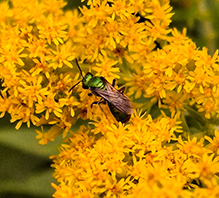 |
Mike Poeppe |
||
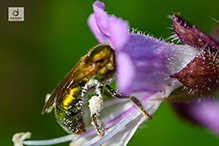 |
||
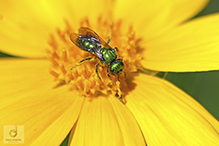 |
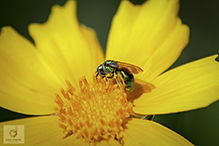 |
|
Alfredo Colon |
||
 |
||
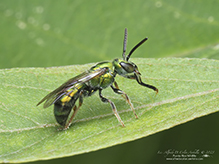 |
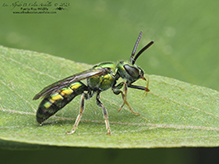 |
|
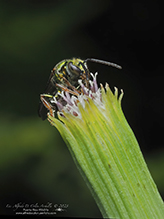 |
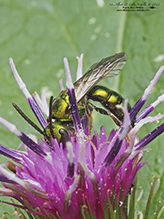 |
|
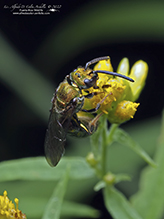 |
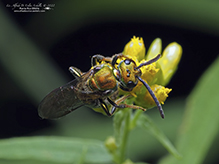 |
|
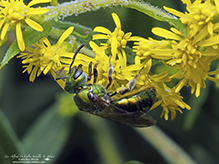 |
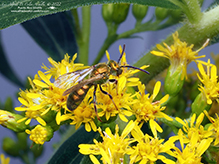 |
|
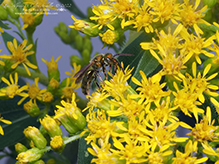 |
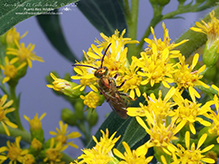 |
|
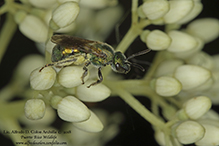 |
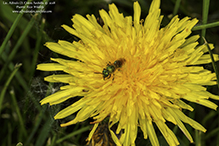 |
|
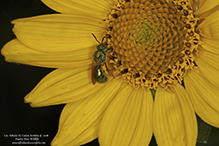 |
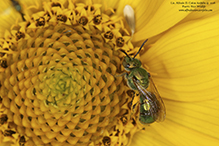 |
|
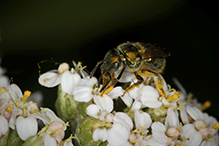 |
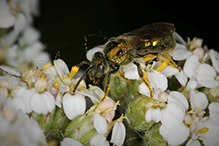 |
|
Bobbi Johnson |
 |
… from the garden |
Dan W. Andree |
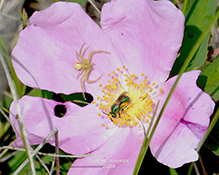 |
Crab Spider and Metallic Green Bee... This crab spider was trying to sneak up on this small metallic green bee at Frenchman’s Bluff SNA Spring 2024. The bee seen the spider when it got right up to it and flew off. |
MinnesotaSeasons.com Photos |
Pure green sweat bee on meadow hawkweed |
||
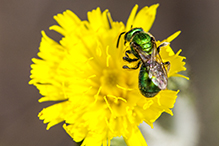 |
||

Slideshows |
Sweat Bee (Augochlora pura) |

Visitor Videos |
Share your video of this insect. |
||
This button not working for you? |
||
|
Other Videos |
Halictid bee blowing bubble |
About
Published on Jun 18, 2015 A Halictid bee (Augochlora pura) lets water evaporate through a little bubble, concentrating the nectar. http://australianmuseum.net.au/movie/concentrating-the-nectar http://link.springer.com/article/10.1007%2FBF01049147 Thanks to Hartmut Wisch, Beatriz Moisset, Doug Yanega for info. Oakhurst Forest Preserve, Kane County IL 6/18/15 |
Cypripedium parviflorum pollen dispersal |
About
Uploaded on May 7, 2011 A native bee, probably Augochlora pura, enters the labellum of this small variety of Cypripedium parviflorum. As the bee squeezes out the rear exit hole, the anther is pressed against the bee's dorsal thorax and a sticky, yellow pollinia mass is deposited. |

Visitor Sightings |
Report a sighting of this insect. |
||
This button not working for you? |
||
Luciearl |
Location: Lake Shore, MN |
 |
| Mike Poeppe 7/30/2025 |
Location: Houston, MN |
 |
Bobbi Johnson |
Location: Silver Bay, MN … from the garden |
 |
Harlie |
Location: Howard Lake, MN One bee stung my daughter who was playing in tall grass. My husband had to smash it to get it to stop stinging her sadly. Never seen a green bee till today. |
Thomas Chorn |
Location: New Brighton, MN |
Alfredo Colon |
Location: Albany, NY |
 |
| Alfredo Colon 8/27/2022 |
Location: Albany, NY |
 |
| Alfredo Colon 8/25/2022 |
Location: Albany, NY |
 |
| Alfredo Colon 8/21/2022 |
Location: Albany, NY |
 |
| Alfredo Colon 8/16/2022 |
Location: Albany, NY |
 |
| Alfredo Colon 8/7/2022 |
Location: Albany, NY |
 |
| Aren B 7/22/2022 |
Location: Hackensack MN Keep seeing these guys around my yard, very pretty and friendly. One of them sat on my finger while I removed it from my house. |
| Mike Poeppe 6/20/2022 |
Location: just west of Houston, MN |
 |
| Alfredo Colon 7/9/2018 |
Location: Woodbury, Minnesota |
 |
| Alfredo Colon 6/9/2018 |
Location: Woodbury, Minnesota |
 |
MinnesotaSeasons.com Sightings |

|
Created: 5/19/2017 Last Updated: © MinnesotaSeasons.com. All rights reserved. |
